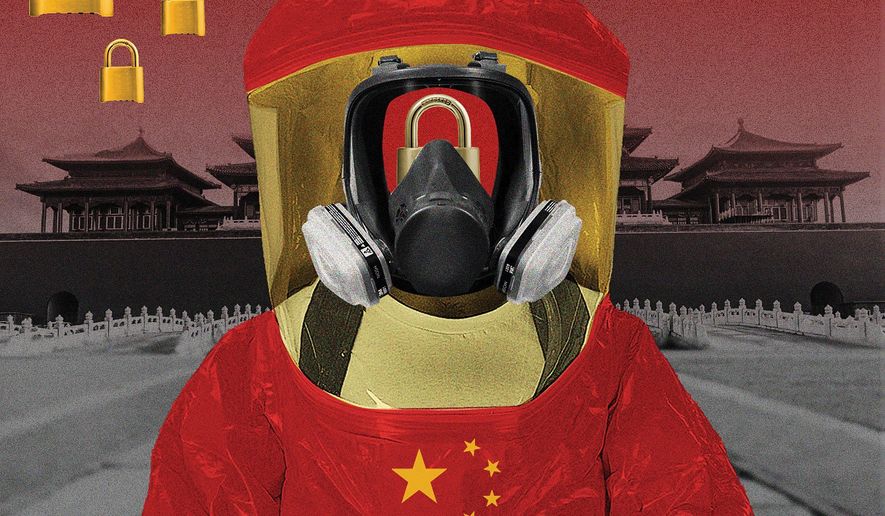OPINION:
Xi Jinping has disappeared from public view.
The general secretary of the Communist Party and the president of the Chinese state was not on the front page of People’s Daily, the regime’s most authoritative publication, on Thursday, Friday or Saturday. China Central Television’s Evening News broadcasts on Thursday through Saturday were also Xi-free. The Friday show led with a segment announcing the publication of an article, on cultural protection and exchanges, in the party’s flagship journal of political theory.
As the widely-followed Bill Bishop wrote in his Sinocism site on Friday, “Now is not the time for the people’s leader to disappear from the view of the people.” Mr. Xi’s reluctance to lead visibly shows, among other things, one of the weaknesses of China’s political system.
That system, as it has fought the coronavirus outbreak, has gone into full totalitarian mode in recent days. About 60 million people are now under some type of local travel restriction; men in biohazard gear are patrolling with automatic rifles in Wuhan, the epicenter; skyscrapers in that city are illuminated ground-to-roof with inspirational messages in the national colors of red and yellow. State media boast workers built a hospital in the stricken city in 11 days. Media in China speak with one voice: that of the Communist Party. Social media censors are obsessive, thorough and speedy.
Many have marveled at the speed of state action. Among the cheerleaders is the director general of the World Health Organization, Tedros Adhanom Ghebreyesus. China News Service, run by the Communist Party, reported that Mr. Ghebreyesus, during a meeting with Mr. Xi in Beijing on Jan. 28, said that China was “winning the admiration of the world.” “The speed and extent of the Chinese mobilization is rarely seen in the world,” he is reported to have said. “This is the superiority of the Chinese system and this experience is worthy of emulation by other countries.”
“Superiority?” Beijing’s response, of course, would have been unnecessary if the party had not suppressed news in December. The first known patient inflicted with the 2019-nCoV virus became ill on Dec. 1.
Chinese officials spent almost all that month scrubbing news of the mysterious respiratory disease. The first official announcement was made on Dec. 31 as was a police announcement of the investigation of eight Wuhan doctors for “spreading rumors.” Officials then spent more than half of January ignoring the epidemic or downplaying its severity.
For instance, on Jan. 19, when it was evident an epidemic was sweeping the city, Wuhan officials held a public banquet for 40,000 families in an attempt to set a world record.
Then, the regime rallied itself. As images of people collapsing in Wuhan streets and corpses littering hospital floors circulated on social media, Beijing immediately began throwing full resources into the fight against the disease.
Yet, the image of totalitarian competence, pushed by the Communist Party and the WHO, is now breaking down. For one thing, Wuhan’s mayor damned his own political system. On Jan, 27, Zhou Xianwang publicly said he could not disclose the coronavirus epidemic because he was waiting for authorization from higher-ups.
The problem is even more fundamental that Mayor Zhou lets on, however. Ming Xia of the City University of New York told me that there is now “wholesale paralysis” of the Chinese government.
Officials fighting the epidemic are being fired on the spot for supposed incompetence. Gone are the health commission chief of Huanggang city, near Wuhan, and a health official in Tianjin, next door to Beijing. Eurasia Group, a risk consultancy, counts 33 canned or scheduled for disciplinary review since Jan. 24.
Firings have persuaded others to do as little as possible to avoid making mistakes and being sacked themselves. These malign incentives reinforce others: China’s officials, for years, have been cautious, hoping to avoid decisions that would attract the attention of Mr. Xi’s ruthless “corruption” investigators.
At the moment, censors are scrubbing the Twitter-like Weibo site of reports that Chinese officials were taking Red Cross surgical masks for themselves. Perhaps the real Red Cross scandal, however, involves the mountains of aid boxes that are not being delivered because the government, which effectively controls that organization in China, is not functioning well.
The breakdown of local governance — and not just in Wuhan — suggests that China’s model, despite what Director General Ghebreyesus said, is definitely not worthy of emulation by anyone.
“Communism is the riddle of history solved,” Karl Marx assured us.
Arthur Waldron of the University of Pennsylvania disagrees. On Friday, he reminded me of those confident words and said the Wuhan epidemic “proves again how utterly wrong Marx was.”
Communism, as Marx said, may know the answers to the great questions of history, but no one at the moment is asking Xi Jinping, who had himself crowned “people’s leader” in December, about them. People are asking him to save their lives.
Unfortunately, Mr. Xi is not doing a very good job of meeting his fundamental responsibility. He can make grand pronouncements, as he did on Jan. 20 when issuing his first words on the epidemic, but his commands — “put people’s lives and health first”— are not substitute for solutions.
Communism in China is facing a riddle of how to end an epidemic, and it is far from showing the Chinese people it has solved that one.
• Gordon G. Chang is the author of “The Coming Collapse of China.” Follow him on Twitter @GordonGChang.




Please read our comment policy before commenting.